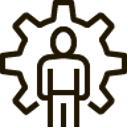 Back to Search
Results
Back to Search
Results

Steve Cadman
Steve Cadman practices in person counselling & therapy in Cambridge & Simcoe as well as secure tele & video counselling over a much broader area. This is done under the supervision of a Registered Psychologist or Registered Psychologist Associate who are members of the College of Psychologists of Ontario.
Hi. I’ll introduce myself a bit.
The foundation of what I do is fostering a comfortable, safe, trusting & encouraging environment for exploring & understanding the issues you bring for personal growth. Life is a long journey & it is not necessary to walk it alone without support. Fortunately, there are many counselling tools & processes that can enable us to better grapple with the challenges at hand, individually, relationally & organizationally when the stresses & complexities of life get too high & overwhelming.
I have been counselling for 30 years in a variety of settings. This includes times as a Counselling Co-ordinator, Administrator, & Director in different group private practices. I have since refocused just on counselling as that way I am not juggling quite so many balls & responsibilities, which is a necessity for me given that I have 2 teenagers.
Initially I worked in residential programs for the emotionally, mentally & physically challenged. Truly fulfilling work but difficult to make a living at. I spent some time at CAS re neglect & the emotional, physical & sexual abuse of children. Children will often believe that they’re bad & brought it on themselves as a way of making the world around them feel safe again. This can often lead to shut downs (not trying in school, etc) or acting out in order to behaviourally let others know that they need help. These things can obviously affect later adult relationships if not worked through. I worked in an Addictions Centre using a 12 Step AA model & individual counselling about unresolved upbringing & life experiences that led to using an addiction to avoid these unconscious triggers / hurts. I’ve led grief & mourning groups at a Grief Centre, with training from Alan Wolfelt, Stephen Fleming & Leslie Balmor. It has also been important to me over the years to help others work through spiritual & organizational abuses of position, power & authority & their progressively disorienting & damaging effects.
I worked in a Domestic Violence program where I had to be on site with police within 30 minutes. Part of the job was attending weekly police shift changes (parades) to present our program. It was Crisis Intervention & follow up work that focused on the DV escalation process (raising voice, swearing, name calling, explicit threats, hitting kicking or throwing something not at the other person (implied threat), pushing, grabbing, throwing, slapping, hitting, kicking, biting, pulling hair, etc). The underlying message is that if you don’t do what I want (control) then I might/can/will lose it on you & not be able to control myself. It’s usually connected to a hated feeling of being previously controlled/out of control, often rooted in childhood.
I have also worked on Trauma Teams & have done many Trauma DeBriefs over the years. This involved going into organizations & businesses within hours or a day of an incident to help people work through traumas related to bank robberies, murders, assaults, suicides, severe accidents, dismissals & corporate mergers. The protective fantasy that this happens only to others in movies & on the news had been smashed. It has been rewarding to be able to help people normalize their reactions, come to terms with our very human limitations & weaknesses, & regain a sense of hope in the face of the overwhelming.
Depression & Anxiety are a very big part of what I currently do, as they weave themselves into the fabric of many individual, couple, family & workplace struggles. It usually needs to be sorted through in order to learn & maintain alternate communication skills & behaviors. Emotions will usually escalate & make working through things very difficult. It’s not because there is no basis to the emotional response, it’s that it rockets out of proportion because of the chemical imbalance affecting our emotions. It’s caused by the stress chemical Cortisol, no matter the source, which wears down our physical neurotransmitters & results in the production of less Serotonin & Norepinephtine. Been there, done that so I know the nuances from the inside out. CBT, 20 minutes of intense daily interval exercise, & either the right antidepressant or naturopathic amino acids (specific concentrated plant based proteins) can work through Depression & Anxiety in about 3 months plus. Both our thoughts & physical exercise affect stress & the chemicals in our body. Where there’s a hereditary component (neurotransmitters less stress resistant) Depression & Anxiety get more easily triggered by stress at earlier ages (kids & teens). Depression & Anxiety questionnaires should be done monthly to gauge progress or lack of it in order to make necessary adjustments.
Working with others on the emotional & relationship Boundary issues that affect all of us has been ongoing for me. This involves tendencies to avoid issues, fear of trying something new in case we fail, perfectionism, driven to over achieve, pleasing others, giving in, inability to say no, or the polar opposite of having no flexibility & having to always be right. The upbringing foundation of these things is fear of criticism, rejection, conflict, being told we’re wrong or defective, & are not worthy. We can feel like we’re a mistake or less important, loved or wanted than other siblings. It can often be unspoken from a parent(s) but we smell & sense it in subtle emotional disapproval / withdrawal. The result is trying to be perfect enough to earn acceptance / affirmation / attention / praise from a parent(s) or the opposite of totally giving up. We then internalize this & live it out to various degrees in later relationships. In essence we end up believing we’re not “good enough” & fearing that others will see this & that we’re a fraud in our achievements. There are many continuum degrees of this, not an all or nothing thing. A good read would be Murray Bowen’s framework on Individuation which focuses on interdependence as opposed to the extremes of (co)dependency or independence.
Anger management has been an ongoing part of what I do. There are almost always avoided hurts &/fears under the anger, often triggered from childhood. They are the air that fills the black balloon. Expressing them functions as pricking pin holes into the balloon that begins to let the air out & decrease / eliminate the anger. Unfortunately anger tends to be the go-to for men because we have been socialized to not express hurts or fears. Usually new & alternate communication skills need to be learned to begin identifying & expressing these hurts/fears.
Men often fear that in learning new communication skills they will be required to become feeling oriented & feminized. Many men will not play ball, or continue playing ball if this becomes the framework. I believe that men need to be able to use their own feeling words (not anger or crudeness) in communication, which will be more earthy than what women will tend to express. As men we have been socialized to stuff our feelings, hurts & fears & to “suck it up & be a man”. Many women generally don’t & probably can’t appreciate the full extent of this & how subconsciously threatening & immature it can feel to the male identity to express feelings. The good news is that old dogs can learn new tricks. Like riding a bicycle, none of us will be able to do this as a mature expert to begin with. It is a growth process that takes time with many ups, downs & stumblings. It is very much something that can be done though. All that men need to do is focus on learning skills (of Active Listening communication) that can be practiced in & out of session individually or as a couple. Male counsellors are proof that this can be done (just don’t ask female counsellors or our families about how feeling oriented we’ve become). We’re very skilled visitors from another planet (logic / analytical) at best, we don’t live on the feeling planet & never will. Fear not.
For my marital & family work I have completed all AAMFT (American Association of Marriage & Family Therapy) required courses, 200+ hours of AAMFT supervision, Gottman Couple Training, etc. I use a Power Struggle (whose right/wrong, wins/loses) / Loss of Emotional Intimacy model, the Myers Briggs giftings framework to help couples begin to work on meeting each others’ differing needs, the 5 Languages of Love, male & female differences, childhood upbringing triggers & habit patterns, etc. We all hit these relationship walls so it’s helpful to get some frameworks to understand how we got there & a roadmap of the way out. No perfection, just approximations with the goal of moving towards improving our wholeness both individually & in relationships. Using a communication skills model without blame, put downs or judging is always a part of this & is the vehicle by which the roadmap is travelled. It’s a lifelong journey, not a quick fix.
I have worked with families over the years on dynamics that are no longer working for some or all family members, & helped them learn new relationship communication & behavioural skills to replace these patterns. Part of this often involves having weekly 1 hour Family Meetings where notes are taken re what each person would like to be different, & proportional 24 hour consequences when agreed to frameworks are broken, first time, every time. The consequences then do the work instead of you having to. Consequences need to be fair & proportionate & agreed on as much as is possible. It’s not a democracy, but parents do need to be benevolent dictators if you want it to actually work. Parents can still set consequences when kids/teens are not being realistic about doing this, but it needs to be a last resort. In order to get kids / teens to buy into this it is necessary for parents to accept 24 hour consequences as well (favorite TV program, hockey game, etc) when we yell, swear, leave dishes around, etc. Same things our kids get consequences for. They’ll then buy in. It’s important to tell kids they’ve chosen the consequence when given because they knew the framework (vs them feeling punished). Fairness & not reacting in anger or withdrawal when giving consequences is a must if we want good relationship & not just obedience. Express love & caring even if you don’t feel like it (which we often won’t). That way there’s no pay back now or in later teen years when our kids will get more creative in doing this. Not a good idea to sow the wind now & later reap the whirlwind. Let the consequences do the work, your emotions don’t have to.
For those who are interested, I am able to integrate a Christian spiritual dimension with professional counselling. I came out of an eastern mysticism/New Age framework decades ago to become a Christian. The two are very different in philosophy & beliefs & are quite incompatible. I do not initiate discussions about the spiritual, I only follow your lead if you make it known & just to the extent that you indicate you want. Forgiveness is necessary (not deserved) in order to keep us from getting internally twisted & hardened. It is by the will repeatedly, not by feelings, as it takes about 3 months to take hold emotionally. Ongoing relationship though, is based on the degree of re-earned trust, not forgiveness.
I’ll share a bit about my personal interests over the years so you can get a bit broader sense of me. They have centred a lot on competitive sports, nature, camping, cottages & travel. In growing up I played on a city champion football team, went to CWOSSA for soccer & wrestling, did martial arts, lacrosse, ping pong, tiddlywinks. I lived in a farming community, primed tobacco for 7 years, raised a pair of great horned owls, did some hunting & archery. I’ve travelled across Canada on a motorcycle to Vancouver Island & back through the US, back packed through India, Nepal, Israel, Egypt, Turkey, Greece, etc. Bit of a wandering soul I guess. My kids have put a bit of a crimp in this. Long Point beach, cottages & bay have always been my go-to for getting away from things to regroup & re-orient. Fishing on Long Point bay with my grandfather is where I’m drawn in contemplation exercises re imagining / visualizing my most peaceful / comfortable place. I believe it’s helpful for all of us to have some place internally as an emotional anchor.
I would like to have the chance to work with you, to help you work through issues, develop new life skills & shed unwanted & unproductive habit patterns. Unapplied understanding is very limited in its helpfulness, whereas changed habit patterns both in thinking (CBT) & behaviour is what sets us free.



Tuesday, Wednesday, Thursday

















Contact Our Client Care Team
Our Client Care Team will respond as soon as possible to get you started.

